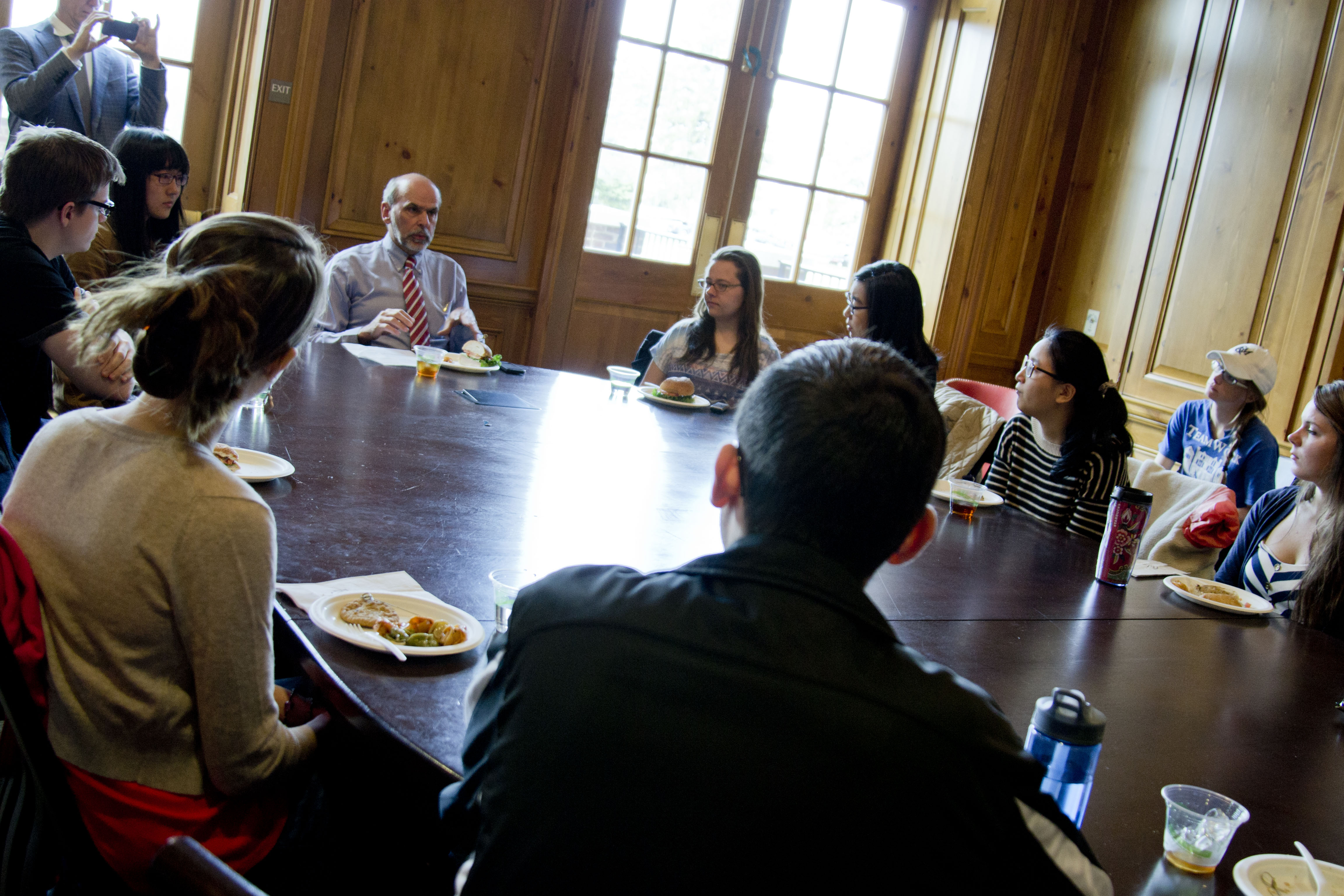By Julia Cinquegrani, Managing Editor ||

Gerald Seib P’17, Washington bureau chief of the Wall Street Journal, came to F&M on Tuesday to give a talk entitled “Why Journalism Matters,” which was part of a monthly lunch discussion series held in New College House.
The series, entitled “What Matters?,” has brought various speakers to campus throughout the year to explore different answers to that question. In particular, Seib discussed the trajectory of his career, the current state of Washington, D.C. politics, and the future of the journalism industry.
For the Wall Street Journal, Seib is responsible for the news and analysis from Washington and heads a bureau of about 65 people. He also developed the digital edition of the Washington Bureau, writes a weekly column, and appears frequently on networks including CNBC, Fox Business Network, CNN, and the BBC.
“I love journalism because it is a great way to find out what is going on in the world, ask people nosy questions, get to meet interesting people, and write,” Seib said.
During college, Seib interned at a Dallas bureau for the Wall Street Journal and was hired to work there after graduating from the University of Kansas, where he was a journalism major.
While working in Dallas, Seib helped cover events in Mexico and Central America.
“I was the 23-year-old kid who would go anywhere and do anything,” Seib said. “The bureau chief [in Dallas] asked me if I could go to Mexico and do a story. At this point I had no passport, had never been out for the country, and didn’t speak a word of Spanish, so I said ‘Sure, I’ll do that.’”
Seib went to Mexico for a week, which was his first experience covering international events. After two years working in Dallas, he transferred to the Wall Street Journal’s D.C. bureau. Since then, Seib has covered defense and foreign policy, politics, the White House, and the State Department.
In his long journalism career, Seib has witnessed the complete transition of the industry, from one based on print newspapers to a digital industry that revolves around a 24/7 news cycle.
“The way the world of journalism has changed in stunning,” Seib said. “When I started in journalism, you wrote an article, turned it into an editor, and it was printed in a newspaper. But yesterday, as an example, I wrote a column, it was posted online, I did a video about that column, I did a video about the minimum wage vote that is coming up, and I wrote a blog item.”
Seib explained how the media revolution has changed the business model for the Wall Street Journal and other news organizations. Many newspapers are starting to make readers of their websites pay small fees to access the content. Seib thinks this business model will be successful long-term because people will understand the value of what news organizations like the Wall Street Journal provide— reliable, objective, and analytical information that is worth the price.
Seib also discussed the current state of Washington politics. He said the political scene is much more polarized than it was in previous decades.
“When I got to Washington there was a certain amount of respect for people who knew how to make deals and negotiate,” Seib said. “Now it’s not. Rather than being revered for being able to do that, politicians are attacked, by their own political party, for having compromised their
principles.”
This polarization could lessen by the emergence of new congressional leaders who can effectively compromise, or if American voters start penalizing politicians by voting against them in future elections because they obstruct compromise, Seib argued.
He then opened the discussion to questions from students. Questions ranged from the impact effect of politics on business to moral conflicts Seib has faced through journalism.
Seib emphasized the importance of journalism because of the public service it provides and its usefulness in helping inform citizens in a democracy. Overall, Seib was optimistic about the future of the journalism industry and its ability to survive the changes it is undergoing.
“If I write a column, does it matter to me if people read it on a piece of paper or on an iPhone or on a desktop?,” Seib said. “We should be agnostic about how people receive information. You either adjust to this world, or you die.”
Sophomore Julia Cinquegrani is the Managing Editor. Her email is jcinqueg@fandm.edu.